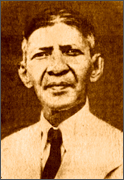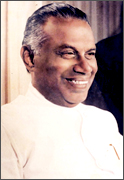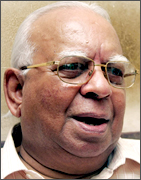Demise of the Rottweiler in Lankan politics
 Rottweiler
is a large black Germen bred dog whose tail wags the body. But then, why
are we talking about the ‘demise’ of this rottweiler and what has that
particular breed got to do with Sri Lankan politics in the first place? Rottweiler
is a large black Germen bred dog whose tail wags the body. But then, why
are we talking about the ‘demise’ of this rottweiler and what has that
particular breed got to do with Sri Lankan politics in the first place?
Rottweiler is of particular relevance to our politics because this
phenomenon of ‘tail wagging the body’ is something that has been linked
with Sri Lankan politics for some time now.
 |
 |
 |
 |
| SJV
Chelvanayakam |
Arumugam
Thondaman |
Rauff Hakeem |
R Sampanthan |
The issue here however is, when a dog is regulated by its tail it
only becomes more volatile, but on the other hand when a country’s
politics is controlled by its tail, there is the danger of a calculative
minority controlling the unsuspecting majority. Since independence, or
from around 1952 the country has been governed alternatively by two main
political parties, the UNP and the SLFP.
Those parties were non communal and there was a sizeable
representation of Tamils, Muslims and other communities in those
parties, but being national parties the leadership, naturally revolved
around the majority community, Sinhalese.
Divided vote
However, a feature in this two party democracy, like in England, was
the national vote generally got split between two parties, sometimes
giving a clear majority to one party and sometimes not.
In such a scenario and specially when one party ended up needing a
clear majority, it was always possible for communal parties like the
Federal Party (ITAK) to negotiate to form a coalition government on
communal terms. This has been happening since 1956 where Chelvanayakam
brought the Bandaranaike - Chelvanayakam (B-C) pact to apply communal
pressure on the Government.
Chelvanayakam became the father of communal politics in Sri Lanka
when he disowned his leader GG Ponnambalam in 1947 to join the first
Government of independent Ceylon, which Chelvanayakam termed as the
‘Sinhala Government’.
At the time there were many hubristic Tamil leaders who just could
not come down to accept the Sinhala political power in the post
independence Ceylon and hence they tried hard to undermine what they
called the ‘Sinhala juggernaut’. BC pact was the first attempt by a
communal political party to influence the democratically elected
National Government to pass legislation on communal and regional
grounds.
The BC pact did not succeed but the failure of the BC pact added one
more to the Tamil list of ‘grievances’ which they were building up to
justify their eventual violence.
Minority parties
In 1965 the UNP having won only 66 seats in a Parliament of 145
members were well short of members to form a Government. The Federal
Party as usual threw their lot with the UNP leading to the Dudley-Chelvanayagam
or the D-C pact.
The D-C pact too, could not succeed due to the same sentiments that
prevented the implementation of the previous pact. But this failure
again added one more ‘grievance’ to the Tamil list of grievances. I
could still remember how the extremist Tamil expatriate community in
London in 80s justified the LTTE crimes on the grounds of ‘non
implementation of the B-C pact and the D- C pact’.
New dimension
The West began to get inundated with anti Sri Lankan propaganda but
the question: how the non-granting of privileges could be interpreted as
a ‘grievance’, went unanswered. Such was the power of the Diaspora
propaganda and the two national political parties in Sri Lanka outdid
each other, trying to blame each other as being responsible for the
‘ethnic conflict’.
The Sinhala vote, equally divided between the two parties lost its
value and the communal parties made the maximum out of the situation to
advance their parochial causes.
Hence it was a case of ‘tail wagging the dog’ in Sri Lankan politics.
This practice however, assumed a new dimension with the advent of A.
Thondaman (senior) to politics. He had a special ability to manoeuvre
the leaders of both national parties to plead to his ‘vote bank’. First
he built his vote bank by getting JR to grant citizenship to so many,
just on an affidavit to prove their dominance and then used those votes
to bargain with every other man or woman in power.
Thondaman used to flaunt his capacity to be the ‘Kingmaker’
irrespective of how the country voted at elections.
M.H.M. Ashraff too learnt this trade well and started to give an
enhanced value to the Eastern Muslim vote. He too was a ‘Kingmaker’ of
sorts and had he not extended his support to Chandrika Kumaratunga in
1994, the history of this country would have been different.
This system of minority and not the majority deciding the leader made
the majority more vulnerable and the minorities stronger over the years.
At the end it affected the Government’s as well as the country’s
stability.
Minority leaders got the Ministries they wanted, the projects they
preferred, funds they required and they could even suspend the projects
they did not want like Upper Kotmale. It was practically a case of the
minorities holding the majority to ransom in the name of democracy. On
the other hand this made Prabhakaran more powerful and ‘justifiable’.
Reversing Rottweiler politics
Mahinda Rajapaksa as the Presidential candidate in 2005 took a few
bold steps to reverse this ‘Rottweiler politics’. When Hakeem and
Thondaman offered support to Rajapaksa candidacy and placed their
‘conditions’, he refused to accede to the conditions but welcomed their
support.
He went to Jaffna and told the gathering that he will do everything
to make everybody feel equal but would never allow the country to be
divided.
The Thondamans and the Hakeems voted against Rajapaksa in 2005 but
Rajapaksa turned the tables.
Even during the tenure of his Office the President had to face
minority lobbying on various issues. But he kept Thondaman in his place
and started the Upper Kotmale project. It is not a case of being
insensitive to minorities but a matter of placing the national interest
above parochial concerns.
The majority have now realized the value of Rajapaksa’s political
philosophy of placing the national interest above everything and
therefore this time they have given a clear mandate to him despite
Sampanthan, Hakeem and even part of Thondaman going against him.
Thus now the era where tail wags the dog has come to an end in Sri
Lankan politics and instead the dog is standing firm with his head held
high. Therefore the country’s affairs are under better control and it is
no longer the Hakeems, Sampanthans and Thondamans who decide the future
course of the country.
[email protected] |



